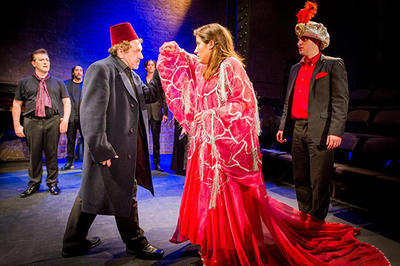Date:
Location:
The Committee on Medieval Studies presents
Samuel England
Associate Professor of Arabic, University of Wisconsin-Madison
The officials who designed Egypt’s Opera House in the 19th century predicted that it would anchor the performing arts economy in the Middle East, citing La Scala in Milan as their glorious model. But the research that Professor England presents here suggests that the Opera functioned as an instrument for visiting and revising the medieval Arabic language, more than as a cosmopolitan bridge to modern Europe. His lecture will scrutinize the ideal of the imperial opera in order to ask larger questions of identity among urban, colonial audiences. How do seemingly non-literary projects like theater programming, publicity, and architectural drafting affect citizens’ relationship to the written past? What role does pre-modernity play in the period that scholars now consider the central moment of Arab modernization, just prior to the First World War? Prof England contends that the construction of the Opera House helps us to answer such questions, and ultimately places “the Middle Ages” in context that modern historians have not yet provided.
Samuel England is Associate Professor of Arabic at the University of Wisconsin–Madison. He teaches Classical and modern Arabic, Mediterranean cultures, and sub-Saharan African sources. His published research covers Classical Arabic poetry and prose, courts in the Middle East and Europe, Crusades literature, Arab nationalist film and drama of the past century, and Romance-language treatments of Islam. He is the author of Medieval Empires and the Culture of Competition: Literary Duels at Islamic and Christian Courts (Edinburgh UP, 2017). Currently, he is writing a book about the role of Classical Arabic in military regimes from the twentieth century to the present day.
Image: scene from a production of Armenian opera Gariné, by Dikran Tchouhadjian, the first opera composer of the Ottoman Empire and known during his lifetime as “the Armenian Verdi” and “the Oriental Offenbach.”
Co-sponsors: Center for Middle Eastern Studies, Committee on Medieval Studies, Harvard University
Contact: Liz Flanagan
